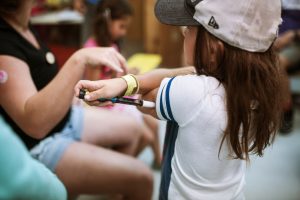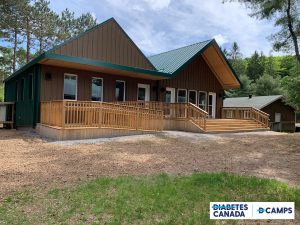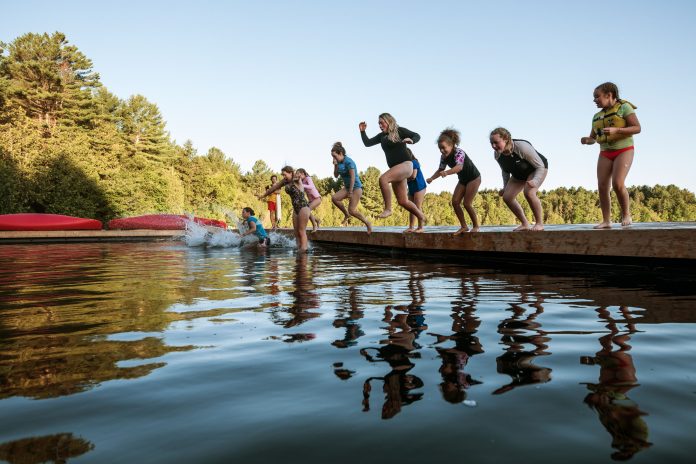After two years of COVID closures, Camp Huronda is back and better than ever with a brand new medical facility that’s being unveiled this weekend.
Camp Huronda in Huntsville is owned and operated by Diabetes Canada as part of their D-Camps program, which hosts family and summer camps for people with diabetes. Camp Huronda has been around the longest of all the camps, hosting over 20,000 campers since it opened in 1964. Laura Syron, president and CEO of Diabetes Canada, said the camps play a crucial role in the lives of the campers because many of them have never met other children with type 1 diabetes, much less have the opportunity to share a traditional camp experience with them.
“It’s a chance to not feel so isolated with the disease, and it’s also a chance for them to learn more about their disease and how to manage it,” Syron said. “They often come back and tell us they feel more independent, that they feel better about how to manage it and that they can manage it, but we also hear lots about how they develop lifelong relationships with their fellow campers.”
The most common forms of diabetes are type 1 and type 2. About 10 per cent of people with diabetes have type 1, where the pancreas creates little to no insulin, and it’s the diagnosis most children with diabetes receive. Type 2, on the other hand, can develop due to various environmental, genetic and lifestyle factors and impacts the body’s ability to use insulin properly.
In recent years, treatment options have expanded, allowing people with diabetes to manage their blood sugar using patches, insulin pumps and other tools. While it’s an effective treatment, it’s not a cure. One of the biggest things people don’t understand is how prevalent diabetes is, Syron said. One in three Canadians either have diabetes or are pre-diabetic, but despite how common it is, the condition often comes with stigma.
“Kids don’t understand, ‘Why are they wearing a pump?’ or ‘Why do they have to go get injections regularly?’ That can lead to a lot of stigma for kids,” Syron said. “As an adult with type 2, there’s also stigma and misunderstanding. There’s a real sense [that] I brought my diabetes on myself, I didn’t exercise enough or I ate the wrong foods, and there’s so many other reasons someone might get diabetes.”

The unveiling on Sunday will be Syron’s first visit to Camp Huronda, but she’s very familiar with the physical, mental and emotional impact of D-camps. In addition to the value they provide for campers, the camps give caregivers a break, help drive fundraising efforts and allow the medical professionals who work at their camps to better understand diabetes.
The camp’s new medical facility, known as the Insul-Inn, will help streamline care for campers while also providing a new and improved space for the medical staff to live. The facility was showing signs of aging, so after a $1.5 million donation from healthcare company Novo Nordisk Canada, the camp was able to have the centre completely rebuilt.
With the ribbon ready to cut at the Insul-Inn and other preparations underway for the start of summer, Camp Huronda is ready to welcome campers and their families on Sunday. Diabetes Canada offered a digital “dose of D-Camps” during the closures and while the feedback was great, Syron said it feels wonderful to open their camps back up, and if it’s wonderful for her, it’s that much better for the campers.
“Nothing beats being able to jump in the lake and go canoeing and sleep in the cabin and all that,” Syron said. “I know that the families, the kids, the returning campers, new campers and also the staff are super excited to be getting back out there.”
From camper to counsellor
Taylor Hall is a longtime camper turned staff member, so he’s returning for his first year as a counsellor. He came to Camp Huronda for the first time back in 2012 at the suggestion of one of his doctors.
“[It] made me feel like a part of the team in a sense and basically told me that you’re not alone in this world,” he said.

Attending camp made Hall realize how many other people were facing the same struggles he was, and it even helped ease some of those challenges by providing education on diabetes management.
“Even though camp is a lot of fun and a lot of running around, it also teaches diabetics a lot more about diabetes,” Hall said. “In my opinion, I learned more one year at camp than I did almost my entire childhood with a doctor because it was more hands-on and real time.”
Hall’s dad also has type 1 diabetes, so along with teaching him how to manage his own blood sugar, the things he learned at camp allowed him to help improve his dad’s approach to care. He encourages kids with diabetes to come to camp while they’re still young enough because it’s been one of the best experiences of his life. So many of Hall’s best memories at camp were created by fun and outgoing counsellors, so he wants to try to be that person for current campers.
“After the one weekend of family camp, I already know that it will be a very good year,” he said. “I’ve already felt that I have made some kids’ week better and I hope to do that this entire summer, every step of the way.”
Hitting milestones and making memories
Camp director Lauren Linklater is a lifer at Camp Huronda. She found out about it through family friends shortly after she was diagnosed and once she had her first summer there, she was hooked.
“I started attending camp as a camper back when I was eight years old, and as my family likes to joke, I never left,” Linklater said. “I continued on as a camper for many years. I then started on as a staff member about 15 years ago and have filled a variety of different roles within our seasonal and now our full-time camp team.”
It still gives her goosebumps to think about her journey from camper to camp director. In her time at Huronda, she’s had the chance to see many campers grow from childhood to college ready, so she’s written a slew of university recommendations and reference letters for camp alumni over the years.
She said it’s special to see the “exceptional adults” they grow into, so she and the rest of the staff are thrilled to welcome both familiar and new faces through their gates again this year.

“I had so many incredible and fundamental experiences as a young person, as a camper, even as a young staff member, growing up and learning so much about myself and so many different experiences through camp,” she said. “Now to have the opportunity to even have the smallest hand in helping to shape and create those opportunities for the next generation of campers is something that I’m so incredibly grateful to do.”
They get to celebrate diabetes milestones like campers inserting a pump site independently or giving themselves an injection for the first time nearly every day, Linklater said, but it never gets old. It’s a special kind of community support for people with diabetes to have fun and learn together, so she hopes the camp and its programs will continue to grow alongside the campers.
Her team welcomes anyone with interest to come by their open house at 11 a.m. on June 26 to learn more about what they do and to see the new Insul-Inn facility unveiled at 1 p.m.
“I can’t think of any better way to kick off our grand opening and kick off for the summer,” Linklater said. “This new medical building is of course absolutely beautiful, but it will allow us to provide the best care possible for all of our campers and our staff in a safe and modern environment, to make sure that we continue to be the best at everything that we do.”
To learn more about Camp Huronda, visit Diabetes Canada’s website.








